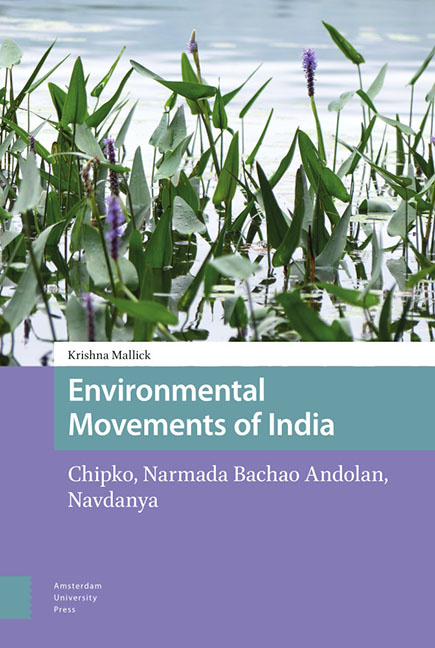Book contents
- Frontmatter
- Dedication
- Contents
- Acknowledgments
- Foreword
- Glossary
- Introduction: Three Grassroots Movements That Made a Global Impact
- 1 Historical and Cultural Contexts in India
- 2 Chipko (Hug the Trees) Movement
- 3 Narmada Bachao Andolan (NBA): Save the Narmada
- 4 Navdanya (Nine Seeds) Movement
- 5 Moral Implications of Environmental Movements
- 6 Hindu Ethics and Ecology
- Conclusion: The Symbiosis of Natural Resources and Local Needs
- Index
Conclusion: The Symbiosis of Natural Resources and Local Needs
Published online by Cambridge University Press: 13 November 2021
- Frontmatter
- Dedication
- Contents
- Acknowledgments
- Foreword
- Glossary
- Introduction: Three Grassroots Movements That Made a Global Impact
- 1 Historical and Cultural Contexts in India
- 2 Chipko (Hug the Trees) Movement
- 3 Narmada Bachao Andolan (NBA): Save the Narmada
- 4 Navdanya (Nine Seeds) Movement
- 5 Moral Implications of Environmental Movements
- 6 Hindu Ethics and Ecology
- Conclusion: The Symbiosis of Natural Resources and Local Needs
- Index
Summary
Abstract
The conclusion reiterates the three main messages of this book: that the human and the environmental world are interrelated; that economic and ecological development are not mutually exclusive; and that there is a relationship between the local and the global. Global activism is valuable, as it helps to bring to the forefront the voices of the disadvantaged. From a moral point of view, the well-being of all humans – both the advantaged and the disadvantaged – are equally important. The Chipko, NBA, and Navdanya movements have made a global impact by taking the discourse on economic development to a new level that includes the voices of the powerless and the centrality of environmental sustainability. In order to make progress towards global environmental sustainability, a paradigm shift must be made in democratic societies.
Keywords: global environmental theory, feminist care ethics, ethics of Nonviolence
As India goes through a sweeping process of economic transformation, environmental sustainability concerns must be at the forefront of its development discourse. India's food grain production has increased considerably from the 1960s to the 1980s, and its economy has developed significantly in the 1990s and 2000s. One might think that, with its robust economic development and self-sufficient food production, all segments of the Indian population have benefited and all issues related to food sovereignty have been resolved. That is not the case today.
The chapters of this book have presented perspectives on the economic development discourse as they took shape within the Chipko movement (1970s), the Narmada Bachao Andolan (1980s and 1990s), and the contemporary Navdanya movement. Social justice is at the core of each of these three movements. Social equity is an important component of social justice. In an equitable society, there should not be any discrimination that prevents people from functioning socially, politically, and economically. Unfortunately, this is not the case in the real world.
By social justice, we generally mean how both the good and bad aspects of life are distributed among the members of a society. Social justice is related to ‘distributive justice’, meaning how the goods and services of a society are distributed. Some of the themes of social justice involve equity, human rights, environmental justice, sustainability, and globalization.
- Type
- Chapter
- Information
- Environmental Movements of IndiaChipko, Narmada Bachao Andolan, Navdanya, pp. 175 - 182Publisher: Amsterdam University PressPrint publication year: 2021



